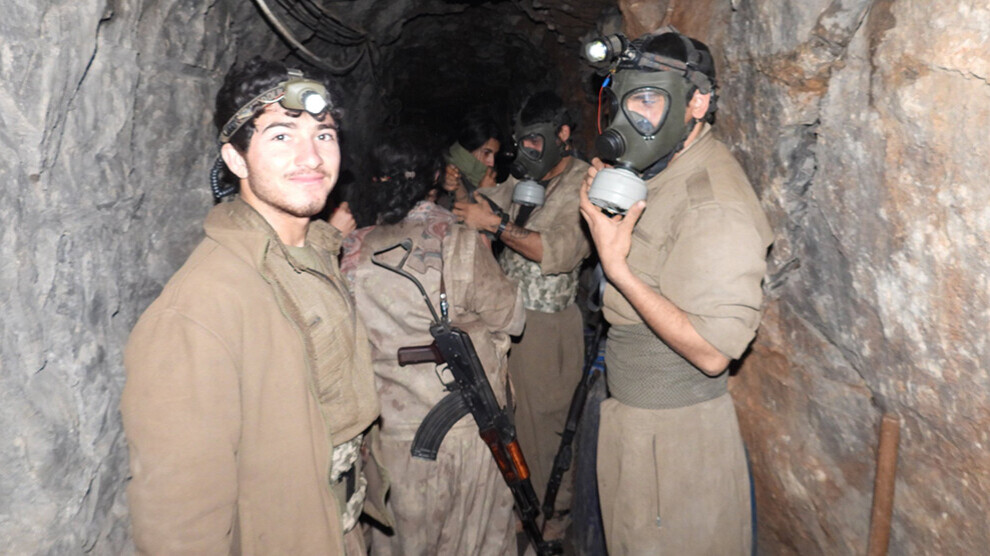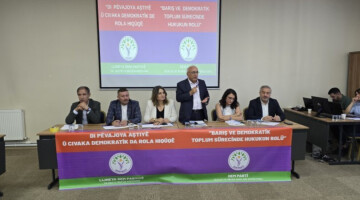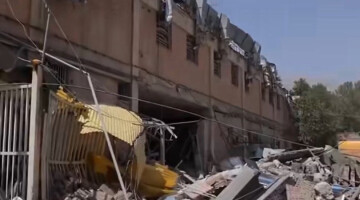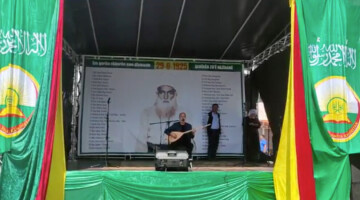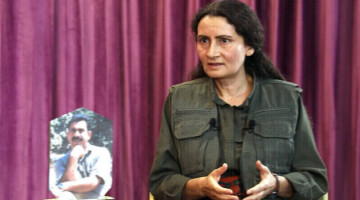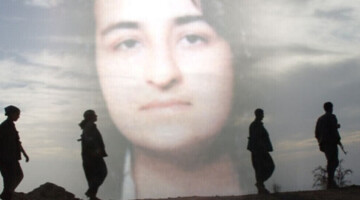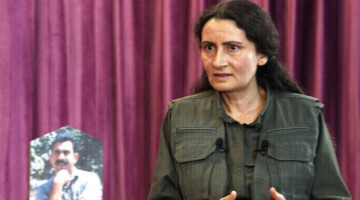The press centre of the People's Defence Forces (HPG-BIM) reports daily from the guerrilla-controlled Medya Defence Zones on the current developments of the clashes with the Turkish army. Daily and monthly reports of the battles, detailed information on fallen fighters, videos of guerrilla actions or the use of chemical weapons by the Turkish army as well as detailed reports on the attacks are continuously shared with the public. Thus, the HPG press centre is one of the most important sources of information on the actual course of the war in the region. The editorial team of the Kurdistan Report had the opportunity to conduct an interview with the HPG press spokesperson Serdar Yektaş for the November/December issue. The focus of the conversation was the question of the use of chemical and other internationally outlawed weapons by the Turkish army in Southern Kurdistan (Northern Iraq).
The HPG reported more than 2000 attacks by the Turkish army with chemical weapons against the guerrillas in Southern Kurdistan since April this year. For readers in Germany, this number may be difficult to comprehend. Can you therefore briefly tell us about the kind of weapons the Turkish army is using against the guerrillas?
Between 14 April and 14 September this year, the Turkish army used internationally banned weapons a total of 2004 times against our guerrilla forces in the Zap, Avaşîn and Metîna areas. These three areas are all in Southern Kurdistan, in a region we call the Medya Defence Zones. The use of these weapons continues after 14 September.
I suspect that many of your readers are not fully aware of the geographical conditions and the course of the war in the region so far. Therefore, I would like to briefly discuss these two issues so that readers can better understand the situation on the ground. In the said areas of Zap, Avaşîn and Metîna, the guerrillas have built a large number of underground positions and tunnels to defend Southern Kurdistan. They are used both as defence installations and as places for everyday life. The guerrillas have positioned themselves and defend themselves in these underground positions and tunnels. Some of these facilities are small and uncluttered, while others are very large and complex. For tactical reasons, I cannot give detailed information on this subject, but in brief we can say that all the underground positions and tunnel facilities that our forces have built in numerous mountain peaks play the role of underground defensive fortresses. No matter how much the Turkish state bombs these positions with its fighter jets, it is simply not able to achieve the desired results in this way.
One of the main reasons why the guerrillas have built these underground positions and tunnels is to take advantage of the depth of the terrain and to be able to defend themselves in this way. Since the Turkish state dropped its soldiers in the said areas of Southern Kurdistan with the help of helicopters from 17 April this year, they have been confronted with underground defensive fortresses. The Turkish army knows that it has to capture the underground fortresses if it wants to control and eventually occupy the areas. But it cannot do so with the help of its conventional forces. Their attack helicopters, warplanes, artillery and lighter weapon systems are no match for the underground positions and tunnels. Moreover, the Turkish soldiers are not brave enough to go into these tunnels and fight there. Therefore, counter-forces [Kurdish village guards paid by the Turkish state], paramilitary forces [Arab-Islamist proxy forces] and mercenaries were initially deployed. They were supposed to take the underground tunnels, but they did not succeed. Dogs were then sent into the tunnels. We have recently published videos of these operations which clearly prove this.
When the Turkish army realised that despite all these attempts, it could not defeat our forces in the underground positions and tunnels, it began to use internationally banned weapons. In order to suffocate our comrades in the tunnels, they first used poisonous gases that severely irritate the eyes and massively restrict breathing or lead to death by suffocation. But because our forces had gained important experience in the use of these weapons during the war in the southern Kurdish regions of Gare [four-day war against the Turkish army in February 2021] and Avaşîn [the war there has been going on since 23 April 2021], we had managed to take certain precautionary measures beforehand, for example in the form of gas masks. So the Turkish state had to realise that it could not defeat the guerrilla forces in the tunnels even with the help of these poisonous gases. In response, the Turkish army began to use even heavier weapons. These include, above all, phosphorus bombs, thermobaric bombs [also called vacuum bombs; double effect through pressure wave and subsequent negative pressure] and chemical weapons.
Regarding the five types of chemical weapons that have been used against our forces so far, we can share the following information with you: First, the nerve gas Tabun has been used. Second, the chemical agent chloropicrin, also called Green Cross, which causes death by suffocation. Third, the chemical warfare agent mustard gas, also known as the Yellow Cross. This agent causes extensive burns to the human body. Fourth, a gas that causes loss or severe impairment of consciousness. It also leads to long-term impairment of human memory. And fifth, pepper gas, which leads to death by suffocation or cardiac arrest in enclosed spaces. These are the types of chemical weapons that were or will be used mainly by the Turkish army in 2021 and 2022. In addition, other comparable weapons were used this year. For example, certain plastic materials were repeatedly burnt in front of the tunnel entrances and the resulting smoke was released into the tunnels. Without precautionary measures, this threatens suffocation or poisoning.
In the five-month balance sheet of the war in Southern Kurdistan that we published, we reported on the 2004 deployments of internationally banned weapons. But in the end, this number is much higher. I would like to go into this in more detail here so that it can be better understood: Turkish soldiers, as already reported, repeatedly come to the tunnel entrances and use chemical and other internationally banned weapons there. Sometimes these weapons are also thrown into the tunnels in the form of hand grenades from a certain distance. In other cases, machines are used and positioned in front of the tunnel entrances. From there, they then pump poisonous gases into the tunnels for hours. In some cases, chemical weapons are also used in the form of larger bombs in the tunnels, where they first explode, then start fires that last for hours. Some of these chemical warfare agents burn for five to six hours. If the air circulation in the affected tunnel systems is good, the effect of these weapons wears off quickly. But again and again, they unfold their effects for hours. We count each such attack as a single attack. But it is important to be aware that a single one of these attacks with internationally banned weapons sometimes lasts for hours, or that explosions are repeatedly carried out in front of all tunnel entrances at the same time so that our forces in the respective tunnel system are definitely hit. So it is difficult to express the scale of these attacks through numbers alone. Therefore, it is important to realise that our guerrilla forces have been facing these attacks for more than five months, more than 160 days.
I would also like to share the following information with you: So far this year, 58 of our comrades have been killed by the use of chemical weapons (as of 22.09.2022). According to the possibilities available to us in the contested areas, we have sent soil samples, water samples and also skin, hair and clothing samples from some of our fallen comrades to the corresponding institutions abroad. We have also published a large number of videos and photos that prove the use of these weapons by the Turkish army.
You also repeatedly report the use of tactical nuclear weapons. How do you arrive at the assessment that the Turkish army is using these weapons?
In the answer to the first question, I first of all only referred to the use of chemical weapons and poisonous gases. The Turkish army is using these weapons intensively against us. However, as I have already mentioned, our forces have now managed to take certain precautions against these attacks. With every comrade killed by chemical weapons, we have learned and adapted our protective measures accordingly. That is why these weapons have not caused excessive damage to our ranks so far.
When the Turkish army realised that the guerrillas could not be brought to their knees by these weapons and instead resolutely continued their resistance, they started to use a new method - to detonate different kinds of bombs in the guerrilla tunnels in order to make them collapse or to make the protective measures of the guerrillas ineffective and to be able to use chemical weapons accordingly more effectively. But the guerrilla forces also developed precautions against this method.
In response, the Turkish army relied on even stronger explosions. Our underground tunnels are characterised by certain peculiarities. They are located entirely under mountain rock. Some of them are hundreds of metres underground and have a length of several hundred metres. Therefore, they cannot be brought down with the help of normal bombs and explosives. Recently, the Turkish army started to carry out explosions of enormous dimensions. At first, we didn't know what exactly was going on there either. The comrades who had witnessed attacks with this kind of bombs reported explosions that practically made whole mountains shake, i.e. they had the effect of small earthquakes. We then investigated more closely and carried out targeted observations. This enabled us to establish that these were bombs with an extremely powerful explosive force. A Turkish general [General Erdoğan Karakuş (ret.) in the programme "Tarafsız Bölge" on CNN Türk on 23.03.2022] himself admitted that the Turkish army used tactical nuclear weapons against the PKK.
Not that this is misunderstood: nuclear bombs and tactical nuclear weapons are different. Tactical nuclear weapons are bombs that, using relatively small quantities of explosives (approx. 50 kg), unleash a blast force of one kiloton. To make their effect even more comprehensible, we can take the explosion in the Lebanese capital Beirut on 4 August 2020 as an example. These are such enormous explosions that entire city districts can be completely destroyed. The decisive difference to classical nuclear bombs is that no radioactive substances remain after explosion.
When you hear about such a massive use of chemical weapons and tactical nuclear weapons, you naturally ask yourself how the guerrillas protect themselves against this or are able to continue to resist under these conditions. Can you give us more detailed information on this?
The guerrillas use the terrain both in depth and in breadth. We protect ourselves from the Turkish state's air force by spreading out in the form of mobile, small units in the terrain. In this way, we make the attack targets very small for them. In addition, our forces use effective camouflage. These measures make it very difficult to spot the mobile guerrilla units in the field. In depth, we rely on the aforementioned tunnel systems. Your question is exclusively directed at the attacks of the Turkish army, which is why I have mainly dealt with this aspect. But it is also important to know that we carry out actions against the occupiers everywhere and all the time. Therefore, the Turkish army cannot carry out its attacks so easily. I would like to give a concrete example so that this aspect can be better understood: If Turkish soldiers position a tactical nuclear weapon or chemical weapons at the tunnel entrances, they cannot penetrate to the inside of the tunnel facilities to use these weapons there. Because whoever of them goes into the tunnels will not come out again. We killed many Turkish soldiers who tried to enter the tunnels and took their weapons and equipment under our control. Therefore, the occupiers can only position the bombs or chemical weapons at the entrances of the tunnels, then move away from there and set off the explosions from a certain distance. As a result, 80 to 90 per cent of the explosion effect fizzles outwards and only a small part unfolds its effect in the underground tunnel systems. So the tunnels serve as protection against this type of attack. Without them, defence against these weapons would be simply impossible. The Turkish state has also come to realise this and has recently started using excavators and other heavy equipment to collapse the tunnel entrances, rendering the guerrillas' precautions ineffective and thus achieving its desired goals.
Do you, the HPG, have information on where Turkey got these weapons? Is it capable of producing chemical weapons and tactical nuclear weapons itself?
In the course of this war, it has become very clear that NATO is supporting the Turkish state both overtly and covertly. This is because virtually all of the Turkish state's weapons - whether its fighter jets, helicopters or other war technology - come from stocks of NATO countries. The technological know-how and the financial possibilities of the Turkish state do not allow it to produce these weapons itself. We therefore know very well that Turkey obtains its weapons from abroad, especially from NATO. Before the Turkish state started its recent occupation attacks [on Southern Kurdistan], there were numerous diplomatic meetings with representatives of the German state. The German state is openly providing support.
It is well known that the use of the aforementioned weapons is outlawed by international agreements as a crime against humanity and a war crime. Therefore, all states that provide Turkey with these weapons take great care to ensure that this does not become public knowledge. But, in the meantime, it can no longer be concealed, because the use of these weapons is obvious. We have documented this extensively and made it public. No matter how hard they try to cover it up, the Turkish state has committed and continues to commit war crimes thousands of times in the Zap, Avaşîn, Metîna and Gare areas. All the states that have signed international agreements on the use of prohibited weapons and have clearly named these weapons are silent today on the war crimes of the Turkish state. This clearly confirms that they support the Turkish state and are accordingly complicit.
Since the spring of last year, you have repeatedly reported on the use of these banned weapons. Internationally, however, this has not met with much response, either in the media or politically. How do you perceive the reactions of the international public?
Already in the past, the Kurdish people were repeatedly described as "a people without protectors". Nobody defends their rights. If we go by international law and the laws of the regional states, we simply do not exist as Kurdish people! Nobody has recognised our existence, identity and status so far. Only through an enormous struggle and at great sacrifice have the Kurds managed to achieve certain results and create their own values. But the international powers have still not officially recognised this. They are still holding on to the Treaty of Lausanne [a treaty signed in 1923, which, among other things, stipulates the division of Kurdistan into four parts]. Because, as the Kurdish people, our existence is still not recognised. We are not considered free people with our own status, which is why our voice is not really heard. Accordingly, the Kurdistan Freedom Movement is also under an encirclement of the occupying states. Our party, the PKK, is isolated everywhere and our legitimate calls and statements are dismissed as unjustified. Even if they are noticed, it is pretended that nothing has happened. Of course, there are many reasons for all this: the interests of the states, political balances, the political conjuncture and others. But whatever the reasons for this silence, it does not change the truth. Because we are simply speaking the truth. We give our lives for the existence and freedom of the Kurdish people. The use of these banned weapons has now been extensively documented and has thus already gone down in history. In the future, this issue will be put even more on the agenda. We will not allow this to be forgotten. Just as we have not forgotten Halabja [poison gas attack by the Saddam regime on 16 March 1988 on the southern Kurdish town of Halabja, which killed up to 5,000 people; ed.] we will never forget the current events, which surpass Halabja by a thousandfold.
Even though it was only possible for a short time in this framework, I tried to share the current situation with you. It may be that the occupying states and the hegemonic forces are sticking to their policies. But we, too, will continue to insist on the truth and share it with our people and the world public. We act first and foremost out of respect for history and the truth. For this reason alone, we will hold on to the truth until the end. We are already giving the sacrifices necessary for this on a daily basis in the form of all our so cherished comrades who are falling. No matter what the attitude of the rulers is, our patriotic people and our international friends are on our side. We are convinced of our ideology of democratic socialism and therefore consider the strength of the people as the most important thing. As long as their hearts beat for us and they support us, we will never be defeated. In this sense, we salute all our active and resistant people. In addition, we would like to thank you for enabling us in this way to bring up all the above facts, that is, the truth.
The interview was held on 22 September 2022.

